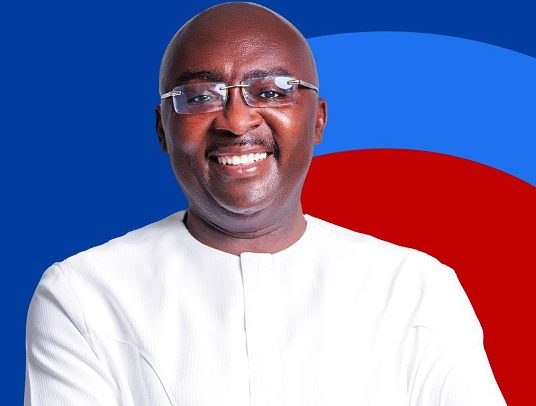Dr. Mahamudu Bawumia
Vice President Dr. Mahamudu Bawumia has secured the top spot on the 2024 presidential election ballot paper, while former President John Dramani Mahama will appear eighth.
The Electoral Commission (EC) conducted the balloting last Friday evening, determining the order of the 13 qualified presidential candidates.
Dr. Bawumia, representing the ruling New Patriotic Party (NPP), will be followed by Daniel Augustus Lartey of the Great Consolidated Popular Party and Akua Donkor of the Ghana Freedom Party respectively.
Ex-President Mahama, who is seeking a second non-consecutive term on the National Democratic Congress (NDC) ticket, will appear eighth.
Other candidates include Christian Kwabena Andrews of the Ghana Union Movement (fourth), Kofi Akpaloo of the Liberal Party of Ghana (fifth), Mohammed Frimpong of the National Democratic Party (sixth), Nana Akosua Frimpomaa Kumankumah of the Convention People’s Party (seventh), and Hassan Ayariga of the All People’s Congress (ninth).
The four independent candidates trailed behind, with Kofi Koranteng, George Twum-Barima-Adu, Nana Kwame Bediako, and Alan John Kwadwo Kyerematen rounding out the ballot in that order.
The balloting followed the EC’s review of nomination papers, which saw 13 candidates make the final cut out of 24 applicants.
The commission disqualified 11 candidates due to unfulfilled requirements or discrepancies on their forms.
Ballot Process
The Electoral Commission follows a traditional two-round balloting process, with round one allowing candidates from political parties to pick based on the sequence of nomination filings.
This determines the picking order for the second round, where candidates select their actual positions on the ballot paper.
For the 2024 election, nine political parties participated. Dr. Mahamudu Bawumia of the NPP, the first to file his nomination, picked first.
His representative, Evans Nimako, picked number 1 in round one, securing NPP’s first pick in round two.
John Dramani Mahama of the NDC picked number 7 in round one, placing him seventh in line for round two.
Before proceeding to the second round of balloting, representatives of ex-President Mahama, Dr. Edward Omane Boamah (Director of Elections) and Fifi Kwetey (General Secretary), raised concerns about one of the balls.
Dr. Boamah pointed out a unique “halo of almost 0.5mm” where the translucent glass met the golden base, prompting the NDC to object. The EC acknowledged the issue and replaced the ball.
This sparked heated debates from Jerry Asare (Liberal Party of Ghana) and Evans Nimako (NPP Director of Elections). After careful consideration, the EC decided to replace the transparent glass bowl with a green opaque plastic bag.
For transparency and fairness, the EC implemented new procedures. Numbers were written on paper, signed by an EC official, then inserted into balls, and finally dropped into an opaque green plastic bag.
This meticulous process ensured the integrity of the balloting process. The second round of balloting commenced smoothly following these adjustments, which led to the outcomes recorded.
Ballot Order Significance
Some political analysts have begun talking about the ballot order significance in presidential elections, with Dickens Ofori Asare Adjei, Head of Communication at the Center for Public Discourse Analysis & MIL Advocate, leading the pack.
According to him, being the first name on the ballot gives one the extra edge over his competitors.
According to him, research suggests that voters often rely on mental shortcuts or “cues” to make informed decisions, and the ballot order can be one of them.
He argued that securing the number one spot on the ballot paper could give a candidate a psychological advantage, increasing their visibility and voter recognition.
Mr. Adjei discussed what he termed as the “Primacy Effect”, where voters perceive the first candidate as more competent or experienced.
He, however, said it was essential to note that this advantage might not guarantee victory, suggesting that being the plaintiff or first to report a case at the police station does not automatically mean one will win the case.
According to him, interestingly, research suggests that ballot order primarily impacts candidates from minor parties, with major parties remaining unaffected.
“So, while the ballot order significance is crucial, it’s not the only determining factor in presidential elections,” he posited.
By Ernest Kofi Adu


